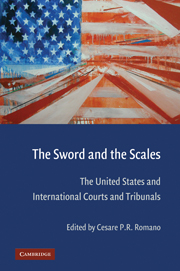Book contents
- Frontmatter
- Contents
- Preface
- Acknowledgments
- Abbreviations
- Contributors
- 1 International Courts and Tribunals and the Rule of Law
- 2 American Public Opinion on International Courts and Tribunals
- 3 Arbitration and Avoidance of War: The Nineteenth-Century American Vision
- 4 The United States and the International Court of Justice: Coping with Antinomies
- 5 The U.S. Supreme Court and the International Court of Justice: What Does “Respectful Consideration” Mean?
- 6 U.S. Attitudes toward International Criminal Courts and Tribunals
- 7 The United States and the Inter-American Court of Human Rights
- 8 From Paradox to Subsidiarity: The United States and Human Rights Treaty Bodies
- 9 The U.S. and International Claims and Compensation Bodies
- 10 Does the United States Support International Tribunals? The Case of the Multilateral Trade System
- 11 The United States and Dispute Settlement under the North American Free Trade Agreement: Ambivalence, Frustration, and Occasional Defiance
- 12 Dispute Settlement under NAFTA Chapter 11: A Response to the Critics in the United States
- 13 The United States and International Courts: Getting the Cost-Benefit Analysis Right
- Index
- References
3 - Arbitration and Avoidance of War: The Nineteenth-Century American Vision
Published online by Cambridge University Press: 05 June 2012
- Frontmatter
- Contents
- Preface
- Acknowledgments
- Abbreviations
- Contributors
- 1 International Courts and Tribunals and the Rule of Law
- 2 American Public Opinion on International Courts and Tribunals
- 3 Arbitration and Avoidance of War: The Nineteenth-Century American Vision
- 4 The United States and the International Court of Justice: Coping with Antinomies
- 5 The U.S. Supreme Court and the International Court of Justice: What Does “Respectful Consideration” Mean?
- 6 U.S. Attitudes toward International Criminal Courts and Tribunals
- 7 The United States and the Inter-American Court of Human Rights
- 8 From Paradox to Subsidiarity: The United States and Human Rights Treaty Bodies
- 9 The U.S. and International Claims and Compensation Bodies
- 10 Does the United States Support International Tribunals? The Case of the Multilateral Trade System
- 11 The United States and Dispute Settlement under the North American Free Trade Agreement: Ambivalence, Frustration, and Occasional Defiance
- 12 Dispute Settlement under NAFTA Chapter 11: A Response to the Critics in the United States
- 13 The United States and International Courts: Getting the Cost-Benefit Analysis Right
- Index
- References
Summary
“[T]he American people … hate war and wish their country to do its share toward promoting peace with justice in the world.”
Elihu Root, 1934What we need is “a moral substitute for war.”
Jane Addams, 1904From the time of America's founding, its citizens embraced alternatives to the use of war for the settlement of international disputes. Early American political leaders understood the promise that these alternatives offered to a small, new nation. At the same time, a significant portion of the American population came to this country committed to religious ideals of pacifism and nonviolence. Quakers, Mennonites, and then a broad array of Protestant denominations provided popular support to politicians willing to resolve disputes using peaceful methods. By the early nineteenth century, Christian pacifists were particularly promoting arbitration as an alternative to war. Later in the century, political parties included arbitration in their party platforms. For almost a hundred years, strong pacifist and pragmatist commitments resulted in popular support for international arbitration. Pacifist and pragmatist programs reached the pinnacle of their influence on U.S. foreign policy between 1899 and 1918. In that period, Jane Addams, the Chicago-based social worker whose pacifism was grounded in her Christian faith, achieved international fame in pressing for alternatives to war. Elihu Root, the pragmatic secretary of war and secretary of state, worked tirelessly in the same period promoting the use of arbitration and international courts as alternatives to war. Both were winners of the Nobel Peace Prize.
- Type
- Chapter
- Information
- The Sword and the ScalesThe United States and International Courts and Tribunals, pp. 30 - 45Publisher: Cambridge University PressPrint publication year: 2009
References
- 1
- Cited by



